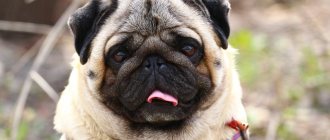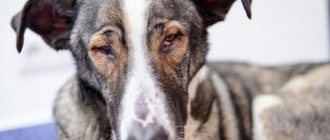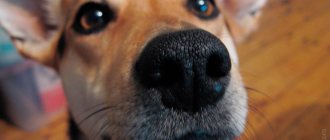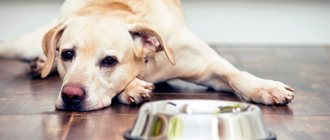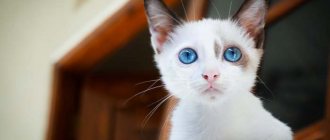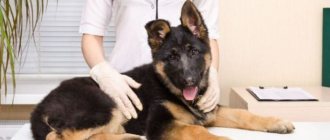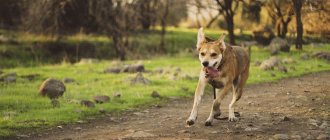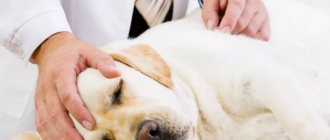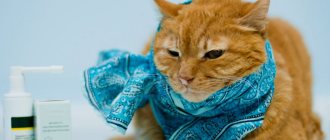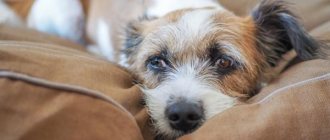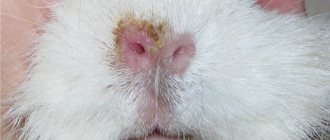Causes of sneezing and snorting
There are 2 groups of factors that provoke sneezing and snorting in dogs. One group includes all situations where the symptom is not a cause for concern:
- single, sudden sneezes that are not accompanied by additional symptoms and do not in any way change the animal’s well-being are not dangerous. A dog may snort after inhaling a strong odor (perfume, flavoring, smoke, dust, etc.);
- Several sneezes in a row, but also without a change in behavior, should not worry the owner. But if they are repeated within a short period of time, perhaps the pet is reacting to an irritant present in the house (smoke, fragrance, etc.).
It is more difficult when the dog often snorts and sneezes for a reason that indicates a disruption in the functioning of organs or systems, or against the background of infectious pathologies.
The following factors should alert the owner:
- infectious (viruses, fungi, bacteria). Sneezing and snorting are accompanied by fever, wheezing, anorexia, and apathy. Diseases: mycoplasmosis, adenoviral infection, plague, etc.;
- allergies (sneezing occurs due to irritation of the nasolacrimal duct and severe lacrimation);
- foreign bodies (insects, garbage, plant seeds and any other object in the small fraction causes a sneeze and the dog tries to “throw them out of the nose” with the help of a snort). Large, especially sharp objects are accompanied by mucous discharge or blood when the integrity of the tissue is compromised);
- lung diseases (symptoms are accompanied by wheezing, auscultation reveals the presence of exudate, bleeding from 2 nostrils is possible);
- neoplasms of various origins (polyps) provoke poor air permeability; in addition to sneezing, the dog can sleep with its mouth open;
- chronic diseases of the nasal cavity, often of an infectious nature, pass with a combination of sneezing and snorting, and discharge from the nostrils.
In brachycephalic dogs, snorting and periodic sneezing are not considered a pathology due to the structural features of the nasal septum. But in combination with snoring or a change in discharge (streaked with blood, thick purulent discharge) should alert you and be a reason to contact a veterinarian.
Helminth infections, parasitic diseases in which the larvae can migrate through the nasal cavity into the lungs, causing sneezing and coughing. Using rhinoscopy, helminths are detected.
Malignant neoplasms in the nose and destruction of mucosal cells irritate the nasopharynx and provoke sneezing in dogs. Together, there is rhinitis with bloody discharge, cloudy mucopurulent discharge. With severe tissue growth, there may be deformation of the muzzle.
The dog sneezes and snorts if there are pathologies in the oral cavity. Inflammation of the gums, caries, sinusitis, rhinitis and sinusitis occurs with sneezing, discharge from the nose and mouth.
Traumatic injury to the sinuses is accompanied by pain, bleeding and repeated sneezing. You can stop it if you stop the bleeding and give the dog local anesthesia.
Common ailments
The most common anatomical diseases among Spitz dogs are:
- Changing teeth.
The most common and first ailment of the Spitz is the change of teeth.
Those with roots that are too long cannot get rid of them naturally. Therefore, a crooked bite of the molars is formed.
My eyes are streaming.
The most common reason why a Spitz has runny eyes is increased sensitivity to external irritants, allergies.
Due to the specific shape of the skull, Spitz dogs are often diagnosed with eye diseases. Therefore, if the owner notices that “the eyes are running,” you should immediately contact a specialist and not self-medicate.
It should be noted that an allergy in a small Spitz can initially affect the eyes and also cause complications in other organs.
Therefore, in order for the allergy to disappear as quickly as possible, you need to know what it is and how to treat it. Daily eye examination and care are the main ways to prevent eye disease in Spitz dogs.
A special type of cough.
The specific structure of the Spitz larynx, or rather not the closedness of the cartilaginous tissues, in the presence of stressful situations, anxiety, or a serious illness, which may be an allergy, often becomes a kind of cough.
In this case, it will most likely seem to a casual passer-by that the dog is sneezing. In fact, the dog is not sneezing, but trying to moisten the larynx.
In order not to listen to the dog sneeze, it will be enough to pick him up, stroke him, and calm him down.
The most common genetic problems for Spitz dogs are disorders of the thyroid gland and adrenal glands.
As a result of dysfunction of these organs, the dog may develop alopecia.
In most cases, alopecia is activated if the Pomeranian:
- Doesn't eat right.
- Experiencing hormonal imbalance.
- He suffered severe nervous shock, illness (this includes allergies), and separation from his previous owner.
Alopecia (refers to the disease of “black skin”) is characterized by excessive hair loss of the pet, blackening of bald areas of the skin.
It should be noted that even if a dog has alopecia, healthy areas of the skin may suffer from other diseases, for example, dandruff.
A small Spitz may suffer from another no less terrible disease than alopecia, namely epilepsy.
It is worth noting that in the early stages of the disease, it may not manifest itself in any way. Therefore, epilepsy is rarely diagnosed in dogs under 2 years of age.
The main causes of the disease are:
- Severe stress.
- Improperly balanced diet.
The dog sneezes and snorts: what should the owner do?
Be sure to contact the RosVet VC if, along with a sneeze:
- there is blood and purulent discharge coming from the nostrils;
- the dog is breathing heavily, there is wheezing;
- have a cough;
- there is a high temperature (above 38.5C);
- the pet holds its mouth open and breathes like this;
- crusts form around the nostrils;
- there is discharge from the eyes.
When experiencing discomfort, the dog begins to rub its nose with its paw, trying to get something that is preventing it from breathing normally. Often, when you sneeze, helminths “fall out”, this means that there are parasites in the nasal cavity and urgent deworming is necessary, coupled with freeing the nasal sinuses from worms.
It is important to know! It is prohibited to use nasal drops for colds, vasoconstrictors and others intended for the treatment of acute respiratory infections in humans. Many drugs are harmful to dogs and can cause their death. Also, you should not remove foreign objects from your nose yourself or wash your nose with a “pear” (jet).
What symptoms should you be wary of?
If a Spitz is choking and grunting, the owner should be alerted to symptoms such as:
- cough;
- weight loss;
- dyspnea;
- vomit.
In this case, the breed of the dog that grunts does not matter. For any representative of four-legged animals, such symptoms will not be a joy.
A dog's cough is a good reason to visit a veterinary clinic.
Prescription procedure for sneezing of any origin
Treatment for a dog with symptoms (sneezing and snorting) depends on the cause. If a pet exhibits a similar reaction to external substances (gases, smoke, allergens), it is enough to eliminate the negative factor and the sneezing will stop.
If infectious pathologies, lung diseases, or allergic reactions are detected, appropriate conservative therapy is prescribed. Upon recovery, the dog will stop sneezing.
For foreign objects in the nasal sinuses, an endoscope (rhinoscope) is used and they are removed under anesthesia. Neoplasms (polyps) are also removed surgically, with the exception of inoperable malignant forms that have “grown” into the nasal septum. In this case, it is surgically impossible to perform resection without deforming the skull.
Eye diseases
A puppy or adult Pomeranian dog may have eye problems. Most often they leak. The cause of this condition is allergies and increased sensitivity of the dog to external irritants.
- hydrocephalus or dropsy of the brain. Hydrocephalus is manifested by the dog circling in circles and aimless movements. Hydrocephalus is also manifested by tilting the head to the side or throwing it back. Hydrocephalus requires serious treatment;
- hypoglycemia (decreased blood sugar concentration). The main symptom is increased drowsiness. As with hydrocephalus, hypoglycemia requires immediate veterinary attention;
- nanism (dwarfism). This is an incurable disease that develops due to poor development of the pituitary gland or problems with the thyroid gland. If the dog is not treated, he may go bald;
- hypothyroidism (thyroid deficiency);
- “open skull” (partial fusion of cranial bones);
- kidney diseases that develop due to insufficient functioning of this organ;
- ear pathologies, etc.
As you can see, many diseases of Pomeranians are a consequence of their miniature body structure. Therefore, this breed requires complete and comprehensive care. Otherwise, infectious and viral diseases will join the pathologies associated with the characteristics of the breed.
Prevention methods
The dog should not be kept in a dusty room or in places where there are strong chemical odors. It is not recommended to smoke or use sprayed fragrances or concentrated perfumes in the house. A dog's sense of smell is several times better than a human's, and where the owner thinks it smells normal, the animal's nasal mucosa is irritated.
Be sure to prevent infectious pathologies, helminthiasis, rhinitis, etc. Periodically inspect the mouth for caries and gum pathology.
If your dog begins to sneeze or snort frequently, there are discharges from the nostrils, or other symptoms of illness are present - do not hesitate! Call the RosVet VC by phone, 24 hours a day. Make an appointment with your veterinarian or call a specialist to your home. The clinic receives visitors 24 hours a day.
Breeders' mistakes
Sometimes there are pathologies in dogs that are associated with breeder mistakes. Such diseases are already predetermined by heredity.
To prevent degeneration, breeders perform castration. Only castration of a “defective” animal can prevent the reproduction of sick dogs.
Also, castration of a dog can be carried out due to the personal preferences of the owner.
If a dog marks, is too aggressive, or attacks others, specialists will also prescribe castration.
By the way, in the UK, castration is performed only after genetic testing of the dog.
And only if pathologies of organ function and complex diseases are identified, castration is prescribed. In all other cases, the dog is treated.
Problems with the functioning of the gastrointestinal tract almost all begin with the correct choice of food for the dog.
If a Spitz eats unhealthy food, then after a few days you can expect diarrhea.
What to do about it? Of course, first of all, you need to urgently consult a doctor, especially if your dog’s diarrhea is alarming, has a “peculiar” smell, or appears regular.
If diarrhea is the cause of overeating, do the following:
- Organize daily fasting.
- Increase the amount of liquid.
- Feed in small doses with a fastening decoction.
If diarrhea does not stop within 2 days, then to exclude fatal consequences you should consult a doctor.
It should be noted that depending on what kind of diarrhea a dog has, it is possible to determine what he is sick with.
Regular diarrhea indicates an incorrectly chosen diet or the presence of food allergies.
In conclusion, it should be noted that in the absence of problems in the gastrointestinal tract, the organization of nutrition, a Spitz may, throughout its long life, not learn about the many diseases inherent in its breed (alopecia, allergies, wet eyes, interruption of breathing when sneezing).
To do this, it is enough to show care and be as attentive as possible.
After all, only a good owner can immediately recognize something wrong in a dog’s behavior!
